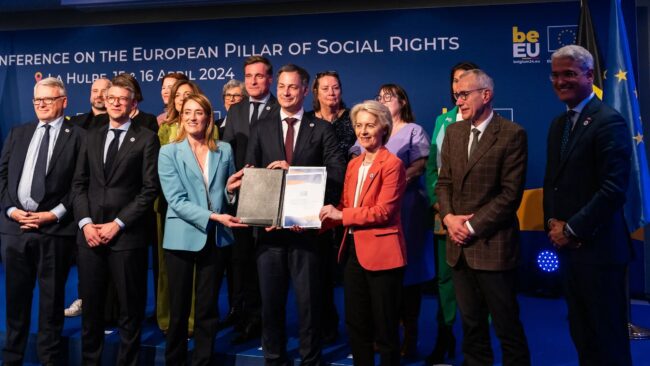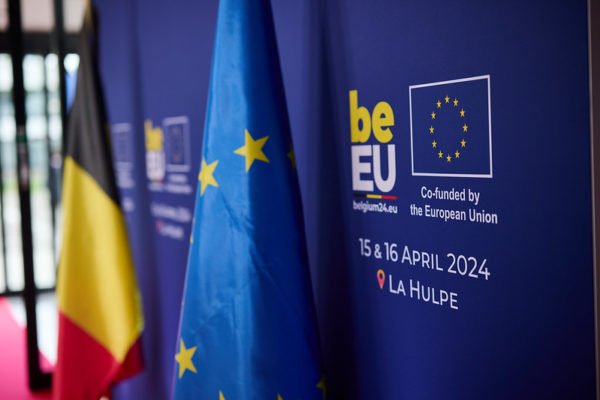La Hulpe Declaration: positive step for social justice in the EU
07.05.24

MMM welcomes the recent adoption of La Hulpe Declaration, under the Belgian presidency. This inter-institutional document aims at shaping the future social agenda of the European Union for the period 2024-2029. The signatories of the Declaration are the European Parliament, the European Commission, and the Council of the EU.
The Declaration re-affirms the European Pillar of Social Rights (EPSR) as the compass for EU policy making, re-commits the EU to meeting the headline Porto Targets and prioritises a 2025 revision of the Action Plan for the EPSR.
This commitment is key for the European Pillar of Social Rights (EPSR) and its Action Plan that have been serving as a compass for tangible policy and legislative measures in the areas of common employment, skills and social challenges, and working and living conditions in the Union. It is therefore crucial that they continue to play an important role in the years to come.
Make Mothers Matter (MMM), as member of the Social Platform, was invited to provide input to the drafting of this Declaration and we are pleased with the general commitment of the EU institutions and member states to the Social Rights agenda.
While we welcome La Hulpe Declaration because it represents a positive step forward following the Porto Social Summit1, we believe it fails to present more ambitious ideas for societal transformation. Over the past three years, poverty has not decreased, and issues such as energy poverty, financial strain, housing insecurity, and severe material deprivation that strongly affect mothers and their families, have only worsened.
The EU’s commitment to enhancing the well-being of all individuals within a society that prioritises alleviating poverty, addressing social exclusion, and combating discrimination, should be paramount. However, the current emphasis on competitiveness, productivity, and industrial policies in framing social policy is troubling.
We acknowledge La Hulpe Declaration’s call for “continued action to tackle gender segregation and to close the gender employment, pay, pension and care gaps and for necessary measures to eliminate gender stereotypes”. And “determined action to combat all forms of violence against women and domestic violence and harmful gender stereotypes”. This addresses some of MMM’s areas of activity within the EU, such as gender equality, work-life balance and flexible working conditions, the gendered care gap, the adaptation of skills in the workplace, and the pay and pension gaps.
We welcome the renewed pledge to fostering work-life balance and committing to the Barcelona targets on high quality, accessible and affordable childcare as part of a vital addition for women’s labour market participation. But we also call for the support of other varied offers of childcare options, that meet the different needs of different families. We recommend, “family centred” solutions (such as Leihomas or “borrow a grandmother”, child minders or other community based alternatives), as they allow parents to choose from a variety of options based on their current and unique needs.
The topic of maternal and child mental health is a growing concern and a focus for us at MMM. We would have appreciated more emphasis and call for action within the Comprehensive Approach to Mental Health, especially on supporting the mental health of all persons starting from the very beginning, i.e from pregnancy.
Since Long Term Care was absent from the Declaration, together with other civil society organisations, we published a joint statement on this topic, asking for a more robust and person-centered long-term care system across Europe and the establishment of a dedicated EU platform.
We believe that Europe urgently requires a revised action plan with innovative proposals to ensure ongoing social progress that leaves no one behind, that cares for its carers and puts social justice at the forefront of all its policies.
1 Social Summit in Porto on 7 May 2021, one of the main messages: The social dimension of the EU is absolutely key to ensure that the double transition our societies need is fair and inclusive, leaving no one behind.”
The New EU Gender Equality Roadmap : A Call for Inclusion of Mothers
04.03.25
The European Commission’s initiative on a new Gender Equality Roadmap post-2025, marks a significant step forward in addressing gender disparities across the European Union. Make Mothers Matter (MMM
Breaking the Cycle: Gender Equality as a Path to Better Mental Health
18.03.25
The Council of the European Union has taken a decisive step in recognising the vital connection between gender equality and mental health.
Europe Must Listen to Mothers: Our landmark report heads to the European Parliament
28.08.25
On 22 September 2025, the voices of mothers will take centre stage in Brussels. For the first time, Make Mothers Matter (MMM) will present its State of Motherhood in Europe








